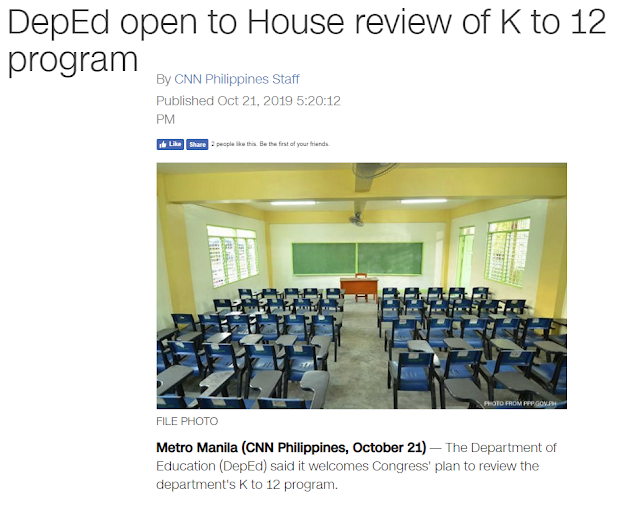A Review of the Philippines' K to 12 Program
Members of the House of Representatives in the Philippines are apparently eager to review the country's K to 12 basic education program. The Department of Education (DepEd) recently issued a statement saying it is willing to work with legislators on a "dedicated review session" that "will provide an appropriate venue to comprehensively discuss concerns about the program and plot out corresponding solutions". The statement also mentions an additional P650 million in the proposed DepEd budget to improve DepEd's K to 12. It is simply amazing that in the Philippines, an executive branch can do a review of its own program with legislators without an independent expert review. This is not evidence-based research and to place billions of pesos on a program that has not been adequately vetted is purely irresponsible. Not only does the K-12 program use most of the national budget, its effectiveness or lack thereof can have a profound impact on the future lives of a generation of Filipino children.
While House Speaker Alan Peter Cayetano seems to be inclined to look at how the current basic education curriculum aligns with employment, there are other as important issues plaguing the K12 program of the Philippines. As a first rough measure, scores in national exams need to be considered. School attendance, students' and teachers' self efficacy, how parents currently view the curriculum are important pieces of data. These need to be provided and examined by a independent expert. This is how a real review process works. I remember the time when I heard a high ranking official from a university in the Philippines offers to serve as a reviewer of the K-12 curriculum when it was proposed. There was nothing wrong with having the initiative to volunteer. But there was one problem, the same person was part of the group that wrote the proposed curriculum. Only in the Philippines....
 |
| Above copied from CNN Philippines |
While House Speaker Alan Peter Cayetano seems to be inclined to look at how the current basic education curriculum aligns with employment, there are other as important issues plaguing the K12 program of the Philippines. As a first rough measure, scores in national exams need to be considered. School attendance, students' and teachers' self efficacy, how parents currently view the curriculum are important pieces of data. These need to be provided and examined by a independent expert. This is how a real review process works. I remember the time when I heard a high ranking official from a university in the Philippines offers to serve as a reviewer of the K-12 curriculum when it was proposed. There was nothing wrong with having the initiative to volunteer. But there was one problem, the same person was part of the group that wrote the proposed curriculum. Only in the Philippines....
Comments
Post a Comment